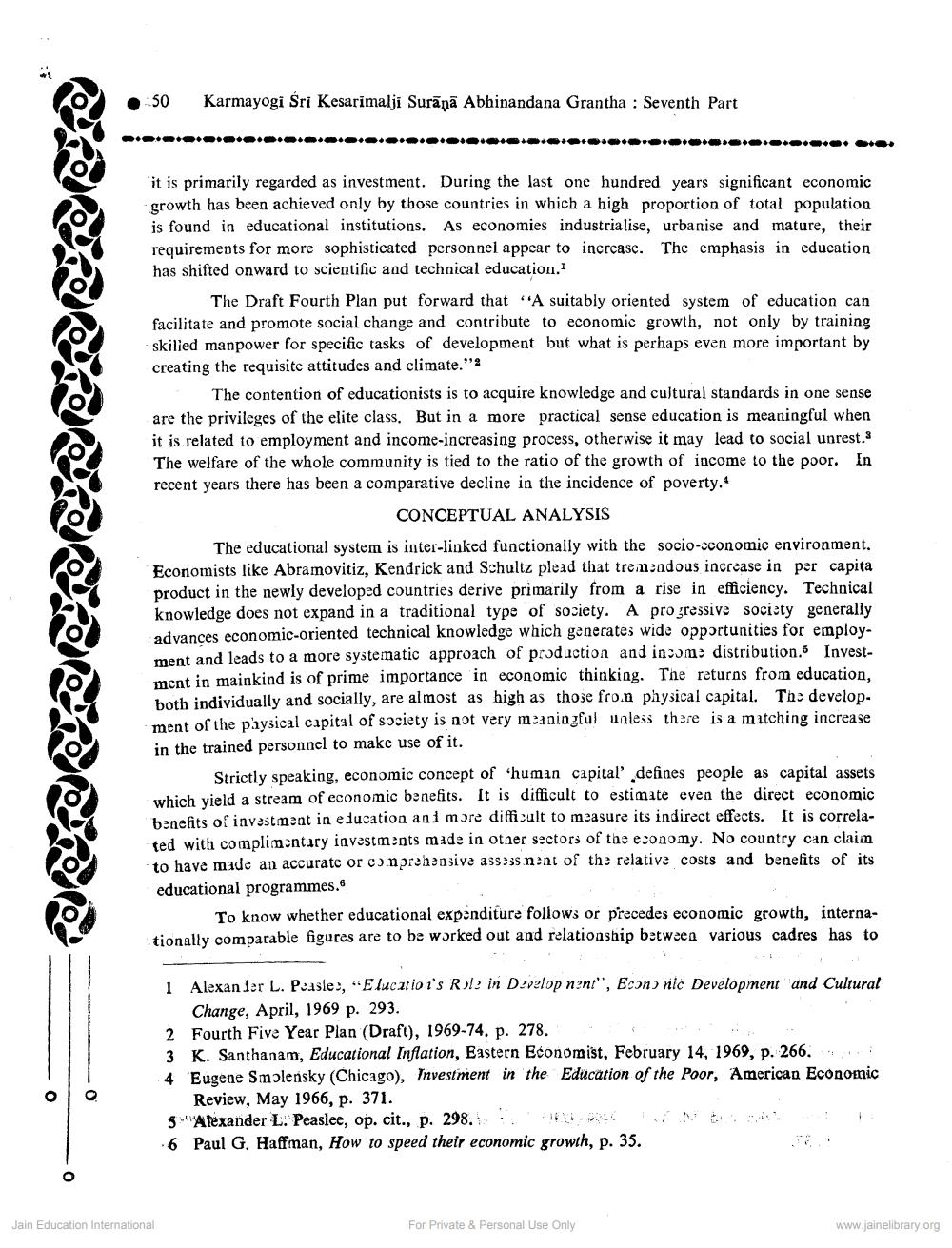Book Title: Education in economic perspective Author(s): B L Dhakad Publisher: Z_Kesarimalji_Surana_Abhinandan_Granth_012044.pdf View full book textPage 2
________________ -50 Karmayogi Sri Kesarimalji Surāņā Abhinandana Grantha : Seventh Part it is primarily regarded as investment. During the last one hundred years significant economic growth has been achieved only by those countries in which a high proportion of total population is found in educational institutions. As economies industrialise, urbanise and mature, their requirements for more sophisticated personnel appear to increase. The emphasis in education has shifted onward to scientific and technical education. The Draft Fourth Plan put forward that "A suitably oriented system of education can facilitate and promote social change and contribute to economic growth, not only by training skilled manpower for specific tasks of development but what is perhaps even more important by creating the requisite attitudes and climate." The contention of educationists is to acquire knowledge and cultural standards in one sense are the privileges of the elite class. But in a more practical sense education is meaningful when it is related to employment and income increasing process, otherwise it may lead to social unrest. The welfare of the whole community is tied to the ratio of the growth of income to the poor. In recent years there has been a comparative decline in the incidence of poverty. CONCEPTUAL ANALYSIS The educational system is inter-linked functionally with the socio-economic environment. Economists like Abramovitiz, Kendrick and Schultz plead that trenendous increase in per capita product in the newly developed countries derive primarily from a rise in efficiency. Technical knowledge does not expand in a traditional type of society. A progressive society generally advances economic-oriented technical knowledge which generates wide opportunities for employment and leads to a more systematic approach of production and income distribution. Investment in mainkind is of prime importance in economic thinking. The returns from education, both individually and socially, are almost as high as those from physical capital. The develop. ment of the physical capital of society is not very meaningful unless there is a matching increase in the trained personnel to make use of it. Strictly speaking, economic concept of human capital defines people as capital assets which yield a stream of economic benefits. It is difficult to estimate even the direct economic benefits of investment in education animore difficult to measure its indirect effects. It is correlated with complimentary investments made in other sectors of the economy. No country can claim to have made an accurate or conprehensive ass: nint of th: relative costs and benefits of its educational programmes. To know whether educational expenditure follows or precedes economic growth, internationally comparable figures are to be worked out and relationship between various cadres has to 1 Alexander L. Puasles, Elucatioi's Role in Develop nont", Econ) nic Development and Cultural Change, April, 1969 p. 293. 2 Fourth Five Year Plan (Draft), 1969-74. p. 278. 3 K. Santhanam, Educational Inflation, Eastern Economist, February 14, 1969, p. 266. ..i 4 Eugene Smolensky (Chicago), Investment in the Education of the Poor, American Economic Review, May 1966, p. 371. 5 Alexander L. Peaslee, op. cit., p. 298. .. t 6 Paul G. Haffman, How to speed their economic growth, p. 35. O Jain Education International For Private & Personal Use Only www.jainelibrary.orgPage Navigation
1 2 3 4 5 6 7 8
